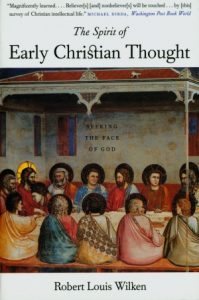Books / Culture / Spirituality
St. Augustine on the Just Society

“It is only in God that human beings find fulfillment and perfection. If they have no sense of God, they have no sense of themselves. Although it may appear that a political community can form its people in virtue without venerating God, over time its life will be turned to lesser ends, to vice rather than to virtue. For virtue is not simply a matter of behaving in a certain way; it has to do with attitudes and sentiments as well as deeds, with loves as well as with duties and obligations. A society based on lies, for example, will not long endure. If the soul and spirit do not serve God, and reason does not bring the body and its impulses “into relation with God,” a people will not be virtuous. “Without the good that is God one cannot have other goods. Only in honoring and serving God can human communities nurture genuine virtue. A just society, then, must be one that ‘serves God.’
Augustine’s City of God defends a fundamental truth about human beings and about society. Only God can give ultimate purpose to our deepest convictions, for example, the dignity of the human person, and provide grounds for communal life that transcend self-interest. A society that denies or excludes the principle that makes human beings human, namely, that we are created to love and serve God, will be neither just, nor virtuous, nor peaceful. The point is twofold. All human life, not just religious life, if it is to be fully human, is directed toward that good which is God, the summum bonum, the desire of all human hearts, and the Lord of all. Second, life directed toward God is always social. Virtue cannot be pursued independently of other human beings. Out of goodness and love God calls men and women to serve him and love one another as citizens of a city, the city of God. It is as a people, not as individuals, that they are blessed. The peace for which the city of God yearns will be found “in the enjoyment of God” and in a “mutual fellowship in God.”
Augustine offers no theory of political life in the City of God. But he shows that God can never be relegated to the periphery of a society’s life. That is why the book discusses two cities. He wants to draw a contrast between the life of the city of God, a life that is centered on God and genuinely social, and life that is centered on itself. Augustine wished to redefine the realm of the public to make place for the spiritual, for God. As Rowan Williams, the archbishop of Canterbury, has observed, the City of God is a book about the ‘optimal form of corporate human life’ in light of its ‘last end.’ In Augustine’s view, ‘It is life outside the Christian community which fails to be truly public, authentically political. The opposition is not between public and private, church and world, but between political virtue and political vice. At the end of the day, it is the secular order that will be shown to be ‘atomistic’ in its foundations.’ A society that has no place for God will disintegrate into an amoral aggregate of competing, self-aggrandizing interests that are destructive of the commonweal. In the end it will be enveloped in darkness.
Some have argued that in the City of God Augustine makes place for a neutral secular space where men and women of good will can come together to build a just society and culture on the basis of ‘things relevant to this mortal life.’ Here there could be a joining of hands of the city of God and the earthly city to cultivate the arts of civilization. For Augustine, however, a neutral secular space could only be a society without God, captive of the lust for power, the libido dominandi. He was convinced that in this fallen world there could be no genuine justice or peace without the worship of God. Where a people has no regard for God, there can be no social bond, no common life, and no virtue.”
This excerpt is taken from The Spirit of Early Christian Thought: Seeking the Face of God by Robert Louis Wilken (New Haven, Yale University Press; 2003) p. 206-208

